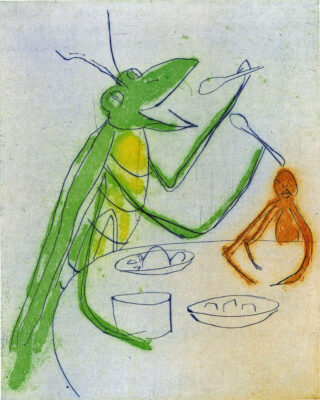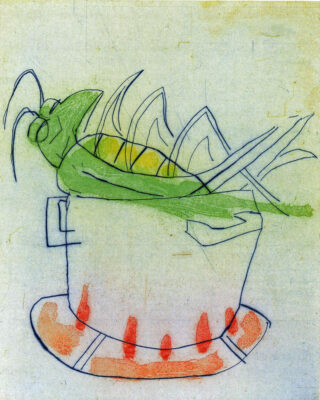Kompa Nanzi ku Kompa Kriki ― Kompa Nanzi and Kompa Kriki
Nilda Pinto
From: Pinto, N. (2018, 1st edition). Kuenta di e araña Kompa Nanzi; Stories of the spider Kompa Nanzi. Curaçao: Fundashon Instituto Raúl Römer (p. 132-136)
Kompa Kriki[1] tabata gran amigu di Nanzi. P’esei Nanzi a kombid’é bin pasa dia serka dje. Kompa Kriki a gosa e kos mashá. Spòrt bistí el a bai hasi bishita.
Ora diesdos or a bati, Shi Maria a yama nan bin kome. Mashá ora kaba Kompa Kriki tabata sinti un oló mashá dushi. Ni kòmbersá e no por a kómbersá drechi.
Su wowonan a kuminsá lombra, ora el a weta Shi Maria parti un bon sòpi di pia ku mondongo.
Kompa Kriki was a dear friend of Nanzi’s. That’s why Nanzi invited him over for the day. Kompa Kriki was thrilled. Elegantly dressed, he paid Nanzi a visit.
At noontime, Shi Maria called them to the table. For a while now, a delicious aroma had distracted Kompa Kriki. He hadn’t even been able to concentrate on the conversation.
His eyes began to sparkle when he saw Shi Maria serve a tasty soup of tripe and shank.

Kompa Kriki a kome un tayó, dos tayó, te el a pidi di tres tayó di e dushi sòpi.
El a lembe boka di satisfakshon.
“Shi Maria, e kuminda a smak mi mashá bon. Despues di kome lo mi flùit un tiki pa boso.” Kompa Kriki a flùit ku tabata un gustu. Tur hende di kas a dibertí nan mashá. Ora Kompa Kriki a lanta pa bai kas, Nanzi di kuné: “No bai largu.”
Kompa Kriki a pensa: mañan mes lo mi bolbe, ya mi por probechá keda kome.
Kompa Kriki finished one plate, two plates, and even asked for a third plate of the flavorful soup. He was smacking his lips with delight.
“Shi Maria, the food was delicious. After our meal, I’ll whistle a tune for you.” Kompa Kriki whistled enthusiastically. All the members of the household enjoyed the music very much. When Kompa Kriki got up to leave, Nanzi said to him:
“Please come back soon.”
Kompa Kriki was thinking: “I’ll come back as early as tomorrow, that way I can stay for dinner.”
Awor Kompa Nanzi a weta Kompa Kriki blo tur dia, nèt ora di kome. Shi Maria tabata sintié obligá di pidi Kompa Kriki keda kome. Komo e no tabata invitá, tur mester a kome ménos pa Kompa Kriki por haña un tayó yen. Na kuminsamentu ningun hende no tabata papia, ma segun dia tabata pasa Nanzi a bira falsu. E ta pensa ku pensa kiko e mester hasi pa Kompa Kriki stòp di bini.
From then on, Kompa Kriki visited Nanzi every day, precisely at dinnertime. Shi Maria felt obligated to ask Kompa Kriki to stay for dinner. Because he hadn’t been invited, the whole family had to eat less, so that Kompa Kriki could get a plate full of food. At first, no one said anything, but after a couple of days, Nanzi got angry. He kept pondering what he could do to stop Kompa Kriki from coming over.
E mèrdia ei, ora nan tabata kome nan funchi ku guiambo, Kompa Kriki a laga sa ku su kasá sí no sa kushiná asina dushi.
“Mi ta kurioso pa sa kon bini Shi Maria su kuminda ta asina dushi. Mi tambe lo tabata ke pa barika di mi yunan ta rondó manera barika di yunan di Nanzi.”
“Wèl,” Nanzi a bis’é, “no ta nada partikular, lo mi konfia bo e sekreto. Ma no bisa ningun hende, tende!”
That afternoon, while they were eating funchi with okra soup, Kompa Kriki told them that his wife was not such a good cook.
“How is it that Shi Maria’s food is so delicious? I’d very much like my children’s bellies to be as round as those of Nanzi’s children.”
“Well, that’s easy” Nanzi said to him. “I’ll tell you the secret. But don’t tell anyone, you hear?”
Kompa Kriki a hura solemnemente, ku ni maté lo e no bisa ningun hende ni un pia di palabra. Nanzi di: “Ora nos kuminda ta serka kla, mi ta bula den e wea. Asina ta, ku mi manteka di wesu di lomba ta stoba un ratu ku e kuminda.”
“Mashá danki, Kompa. Dios bindishoná bo.”
Kompa Kriki swore solemnly that even if they were to kill him, he would not whisper a single word to anyone. Nanzi then said: “When our food is almost ready, I jump into the pot. That way, the bone marrow in my spine simmers with the food.”
“Thank you, Kompa Nanzi. May God bless you.”

Si Kompa Kriki tabata bobo, Koma Kriki tampoko no por a huzga drechi. Ta p’esei a sosodé algu teribel. Su siguiente dia Kompa Kriki a warda ora e kuminda tabata serka kla, pa e drenta kushina. El a puntra Koma Kriki: “Ta kiko nos ta kome awé, dui?”
“Awe ta pampuna stobá nos tin, Pai!”
Kompa Kriki a konta su kasá loke Nanzi a siñ’é.
“Laga mi weta si mi wesu di lomba tambe tin mes dushi manteka ku esun di Kompa Nanzi.”
Kompa Kriki was dumb, but Koma Kriki wasn’t that smart either. That’s why something terrible happened. The next day, Kompa Kriki waited until the food was almost ready, before entering the kitchen. He asked Koma Kriki: “What are we eating today, dui?”[2]
“Today, we’re having stewed pumpkin, Pai.”
Kompa Kriki told his wife what Nanzi had taught him.
“Let me see, if the bone marrow in my spine is as delicious as Kompa Nanzi’s.”
Kompa Kriki a hisa tapadera di e wea di kuminda i el a bula bon konfiá aden. Shonnan! El a grita asina duru ku tur hende di kas a kore bin weta ta kiko ta pasando. Ma, ai! Nan a yega lat. Ya nan no por a saka Kompa Kriki afó. E pober a muri un morto mashá doloroso.
Kompa Nanzi, Shi Maria i tur e yunan a bini morto i Nanzi a yora amargamente morto di su bon amigu.
Kompa Kriki lifted the top off the pot and jumped inside confidently. Heavens! He screamed so loud that everyone in the house came running over to see what had happened. But, ai! They were too late. They couldn’t pull Kompa Kriki out of the pan. The poor soul died a very painful death.
Kompa Nanzi, Shi Maria, and all the children attended the funeral and Nanzi shed many tears for the passing of his dear friend.
Notes
[1] Kriki: cricket
[2] Dui: term of endearment (sweetheart in English)
